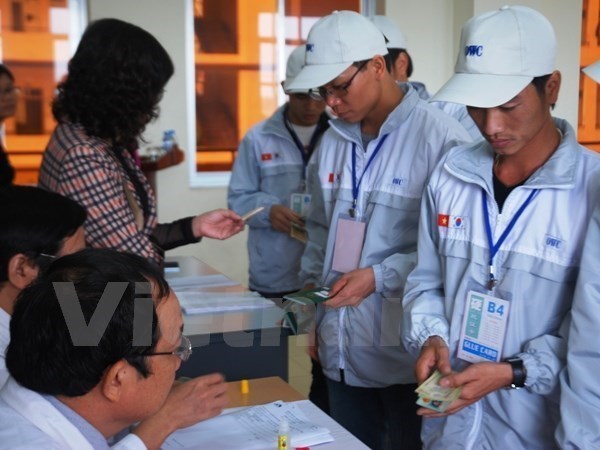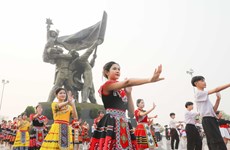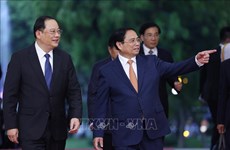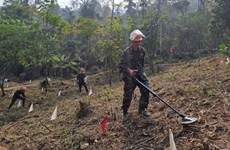Labourers warned of frauds in RoK with E-7 visas
 Vietnamese workers conduct procedures to go to work in the Republic of Korea - Illustrative image. (Photo: VietnamPlus)
Vietnamese workers conduct procedures to go to work in the Republic of Korea - Illustrative image. (Photo: VietnamPlus)Hanoi (VNA) – The Department of Overseas Labour Management under the Ministry of Labour, Invalids and Social Affairs on October 18 warned of frauds related to the Republic of Korea (RoK)’s reception of technical workers with E-7 visas.
The E-7 visa is an employment visa for foreign nationals with expertise in 86 sectors including electrical/electronic/mechanical engineering and hardware/software development. Those with the E-7 visa are allowed to work in the RoK for one to three years and can extend their stay for another one to three years.
A representative of the Department of Overseas Labour Management said the Korean government announced in August 2022 that it decided to expand the policy of receiving guest workers to work in technical occupations. These included welders, painters and electricians for shipbuilding. They did this by increasing the quotas and reducing professional qualifications and working experiences.
After the RoK enforced the new recruitment policy, the department received information about several individuals and organisations which are not authorised to send labourers to work abroad. However, they have invited labourers to take part in vocational training courses and take exams to work in the RoK with the E-7 visa. This is not in line with the laws of Vietnam and the RoK.
The Department of Overseas Labour Management recommended labourers stay vigilant against these tricks. Labourers who want to work in the RoK in the technical occupations such as technology, mechanical engineering, electricity, electronics and welding, should contact businesses which are licenced to send Vietnamese workers to work abroad under contracts.
It also reminded labour export enterprises to recruit labourers for working overseas only after the department approves the preparation of workforce or the registration of labour supply contracts.
Labourers who need consultancy and information or want to report information about organisations and individuals which provide training or recruit labourers to work in the RoK with the E-7 visa contact are recommended to contact the Department of Overseas Labour Management at 41B, Ly Thai To street, Hoan Kiem district, Hanoi or via telephone number 0243.8249517, extension 301 and 302.
Over 1 million Vietnamese nationals have been sent abroad to work in the past decade, up nearly 40% from the figure recorded in the pre-2012 period, according to a report delivered at a national conference held recently in Hanoi.
A hybrid event was organised to review the 10-year implementation of Directive 16-CT/TW dated May 8, 2012 by the Communist Party of Vietnam (CPV)’s Secretariat on strengthening the CPV’s leadership on the management of contracting guest labourers and specialists to work abroad.
Reporting on the directive’s implementation, deputy head of the Party Central Committee’s Economic Commission Do Ngoc An said that legislation on this matter has been improved to align with international laws and practices and Vietnam’s policies on global integration.
The country has exerted greater efforts in vocational and foreign language training for guest workers and specialists as well as provided them with knowledge on their host countries’ legal systems and customs, and career counselling, he said.
There are now 451 organisations and companies providing overseas labour services, doubling that of 2012 when the directive was issued. The number of foreign markets that Vietnamese workers are sent to reached 25 in 2022, compared to just nine in 2013, according to An.
Vietnamese guest workers earned an average income of 200 million VND (8,536 USD) per person per year, much higher than that of those doing similar jobs in Vietnam, he said, adding the remittances sent by them have contributed to eradicating poverty, expanding business and production, creating jobs and increasing the country’s foreign currency reserves.
In his remarks, Minister of Labour, Invalids and Social Affairs Dao Ngoc Dung urged ministries and local administrations to further enhance regulatory frameworks on the matter. Greater attention should be paid to negotiating with host countries on overseas labour agreements, improving state management on the issue, researching foreign labour supply and demand, and developing a sustainable, flexible and modern labour market./.












